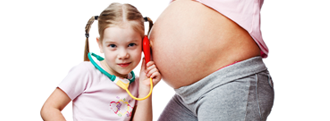Your Child at 3 Years
Pediatric Development Guide for Parents in Rochester
The board-certified pediatricians at Westside Pediatrics have provided this pediatric development guide to help educate parents on some of the amazing things their child can do at this age and tips around care including oral hygiene and establishing healthy eating habits. Call (585) 247-5400 to schedule an appointment at our pediatric office in Rochester, NY.
WHAT YOUR TODDLER CAN DO
At this age your child can probably:
Begin playing with other kids but still have problems sharing…
Begin counting and know some colors…
Draw shapes…
Ask many, many questions!…
Make up stories…
Children have vivid imaginations and like playing grown up…
Have trouble distinguishing fantasy from reality…
Be understood by strangers most of the time…
Understand “same” and “different”…
Become more independent…
Separate easier from parents…
What you can do with your toddler
Give your child a chance to play with other kids at a day care center or in your neighborhood.
Continue to give your child books and records. You can also let him play with paints, crayons and clay.
Play interactive and easy games like memory games, Candyland, matching colors and shapes. Take them to the playground and safely let them explore their own motor skills. Let him scribble and paint with crayons, markers and watercolors.
Be patient with your child’s questions and stories. Answer them simply and honestly.
Encourage your child to dress and feed himself. Have him take some responsibility at home. He can begin to put away his toys or help set the table.
Being a parent is enjoyable but hard work. There is so much to learn! Sometimes it helps to talk to other parents or get some advice from someone outside the family. If you would like to find out more, call this number and ask about parenting programs in your area.
LIFE LINE
275-5151
Teeth care
Baby teeth are important and need care. Babies and young children need their teeth to eat solid foods and to hold space in their mouths for the permanent teeth to come later.
There are some simple things that you can do to care for your child’s teeth.
Toothpaste that contains fluoride may harm your child if he eats it. Keep the quantity of toothpaste to the size of a pea.
Older children can use toothbrushes but will need help from you, as it’s easy for them to miss the backs of teeth and their molars.
By age three, it is a good idea to take your child to the dentist. Your pediatrician may be able to refer you to a dentist in your area.
The dentist will examine your child’s mouth and teeth. His teeth will be cleaned and the dentist may take xrays to see how facial bones and teeth are developing.
A child’s first trip to the dentist can be a scary experience, and it helps to prepare your child by telling him that the dentist will look at and count his teeth and possibly clean them. The dentist can help you explain the rest.
Be aware of your own attitude/anxieties regarding the dentist as your child may well pick up on this.
Beginning good habits in childhood leads to good habits in adulthood.
Safety
Safety is always important. Children this age can get into medicine bottles and cleaning fluids. Remember to keep all dangerous materials in locked cabinets or above your child’s reach.
All cabinet and storage doors should have latches on them.
Street Safety
Your child is starting to express his independence but he still needs constant supervision, especially when he’s playing outside.
He is in danger of being hit by a car when he darts out into the street while playing. Show him the curb and teach him to always stop before the curb. Teach him to never cross the street without a grown-up.
Don’t allow him to ride his tricycle in the street. Instead take him to the playground or park to play.
Don’t rely on older siblings to watch younger children while they play outside. No one watches your child as closely as you do.
It’s a good idea to have your child wear a helmet when he learns to ride a tricycle. It will protect him during falls and get him in the habit of wearing one as he gets older.
If you take your child as a passenger on an adult bicycle, he needs an approved safety helmet as well.
POISON CONTROL CENTER
1-800-222-1222
Feeding a fussy eater
Your toddler tests his independence by choosing what to eat.
This is why your child’s eating habits are probably unpredictable. This is very normal behavior for a three year old. Here are some ideas to help handle a fussy eater.
Don’t force your child to eat. This only sets up a power struggle between you and your child.
Children don’t need to eat three balanced meals every day as long as their weekly diet is balanced.
To help your child eat foods he doesn’t like, mix them with foods he does like.
Don’t force your child to empty his plate. Small portions won’t seem so overwhelming to your child. He can have a second helping if he’s still hungry.
Offer food when your child is hungry, not as a pacifier, reward or punishment.
Offer milk with his meals. It will help to fulfill your child’s calcium needs. If he doesn’t like milk, try yogurt or cheese as substitutes to provide calcium that he needs to help build strong bones and teeth. Children should be drinking 16oz per day, but more than 24 oz. per day may interfere with eating solids.
Experiment with different ways of cooking foods. That may be enough to get your child to eat them.
If your child is hungry and wants to eat 5-6 times a day, let him. Serve snacks that have high nutritional value like fruits and vegetables instead of candy and cookies.
Make meals a family time. Let your child be a kitchen helper.
Sit down together as a family and have each family member share something they did that day (even your toddler). This will help to make meal times more of an event to your fussy eater.
Foods To Avoid Below Age 4
Nuts
Hard Candy
Popcorn
Fun Foods for Kids
Use cookie cutters to make sandwiches into fun shapes.
Make finger sized food like small chunks of cheese or fruit.
Make an “egg in a basket”. Cut a hole into the middle of a piece of bread. Pour a raw egg into the hole in the bread and fry both the bread and the egg together.
Helping your child learn
Children learn through play. Three year olds want their parents to play with them. They like family events such as birthdays and holidays. Here are a few ideas on how to help your child learn from play.
Time, Weather and Seasons
Children feel more in control when they know what is going to happen. For example, they know that their birthday is in five days. Help your child to understand time better by making a calendar pad so that he can tear off a page each day. Decorate the calendar with pictures for holiday and special events.
Numbers
Parents should count together with their child to teach the correct number sequence. Anything can be counted—pieces of cheese, clapping, brushing teeth or coins. Make counting a part of your everyday routine with your child. He may also like to try counting backwards.
Messy Play
Three year olds love to explore and experiment, but they usually are pretty messy. The bathtub is a fun place to play with water, shaving cream, ice cubes, soap bubbles or soap paints. Outside is also a good place for messy activities. Try finger paint with your child on a plastic tablecloth.
How about making a mud pie or building a sandcastle? Remember that water and outdoor play both require your close supervision.
Reading
Spend time reading picture books to your child. Talk about the emotions that the characters are feeling. A puppet may help to discuss the story. Books with cassette tapes may also help your child become more interested in reading. By reading to your child, you will help him learn to read. Ask him to identify sounds and letters. Try using alphabet blocks when you do this.
Use the Public Library System. Children’s librarians are eager to help.
Television
Limit television viewing and total screen time to less than 2 hours. Watch programs with him so you know he is only watching programs that you approve.
COMING ATTRACTIONS
Before his next checkup, your child may:
Tell tall tales…
Throw a ball overhead…
Ask many questions…
Hop on one foot…
Be aware of his own gender…
Be able to dress himself…
And take care of his toilet needs…
Take time to be with your child. This can be a frustrating period for both of you. Hold him and tell him you love him!
Schedule an Appointment
If you have more questions regarding pediatric development milestones and your child’s development, call our pediatric clinic in Rochester, NY at (585) 247-5400 to request an appointment with one of our exceptional pediatricians.




